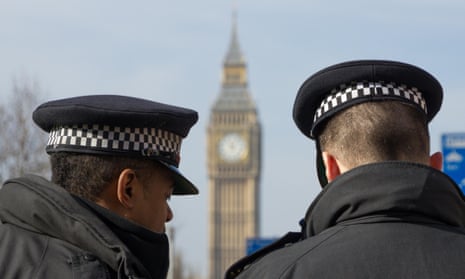Police watchdogs are to investigate forces in England and Wales over the sharing of data on victims and witnesses of crime with immigration enforcement authorities, the Guardian can reveal.
The move comes after the rights groups Liberty and Southall Black Sisters lodged the first super-complaint against the police, challenging what they said was a potentially unlawful and harmful practice.
The super-complaint process became operational last year and allows designated organisations to raise issues on behalf of the public about harmful patterns or trends in policing.
After an eligibility assessment, Her Majesty’s Inspectorate of Constabulary (HMIC), the College of Policing and the Independent Office for Police Conduct (IOPC) have launched an investigation into the groups’ complaint.
Debaleena Dasgupta, a lawyer at Liberty, said: “Referring victims of crime to the Home Office to enforce the ‘hostile environment’ policy is not only cruel, it is arguably a breach of the police’s duties.
“This practice means victims are too scared to report serious crimes and witnesses may be forced to withhold information that could be vital in police investigations.
“The evidence gathered shows that even when crimes are reported, the police are prioritising minor immigration enforcement actions over investigating the more serious crimes that have been brought to their attention. This leaves perpetrators free to offend with impunity and we are all less safe as a result.”
She said Liberty hoped the investigation would contributed to ending the practice.
The investigation may result in an inspection by HMIC, an investigation by the IOPC, or the issuing of recommendations – for example, that another public body is better placed to deal with the issue, or that the police should change their policies or working practices – or it could find that the super-complaint is either unfounded or needs no further action.
Pragna Patel, the director of Southall Black Sisters, said the group wanted to see “a transparent and thorough investigation into the question of how and when the police decided to enforce a policy that focuses on reporting vulnerable migrant women to the immigration authorities instead of offering protection and apprehending abusive perpetrators. This is an issue of serious public concern since it undermines trust in the criminal justice system.”
After learning that forces were likely to face a challenge over the issue, the National Police Chiefs Council issued new guidance. The measures for England and Wales included a ban on officers checking the police national computer solely to learn if someone had leave to remain in the UK.
However, lawyers for Liberty claimed the guidance did not go far enough to protect victims and witnesses of crime.
